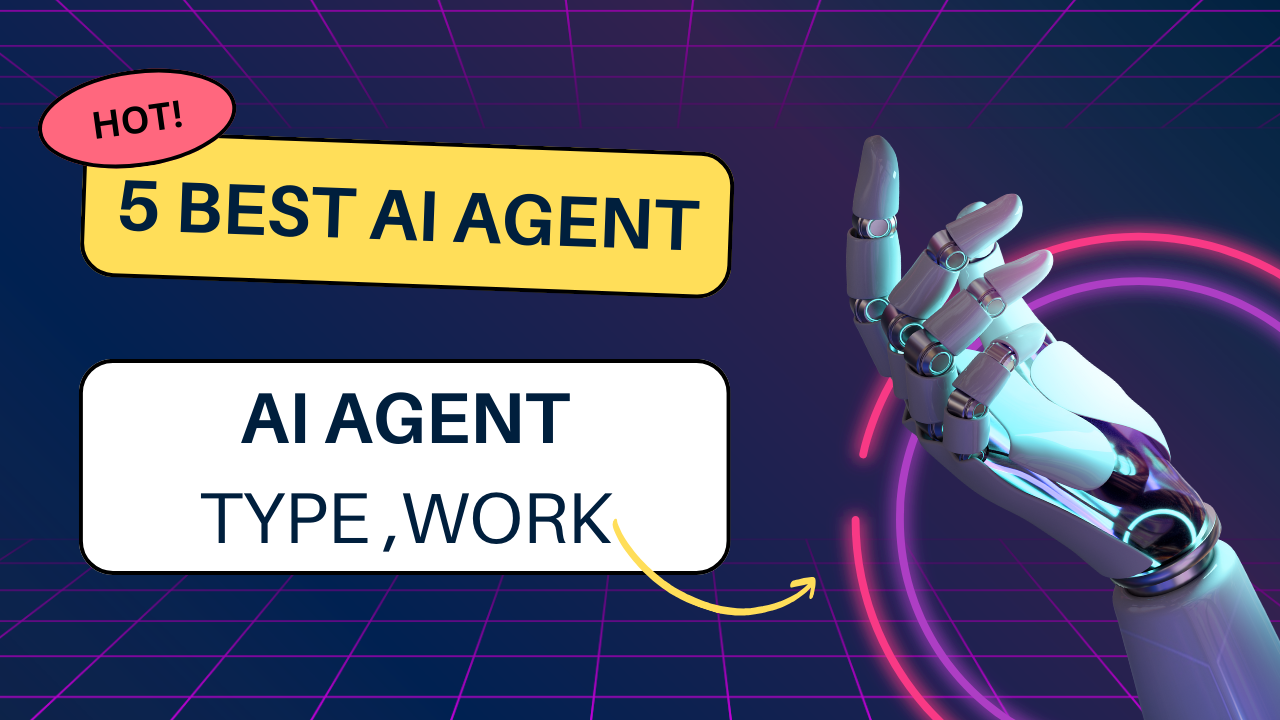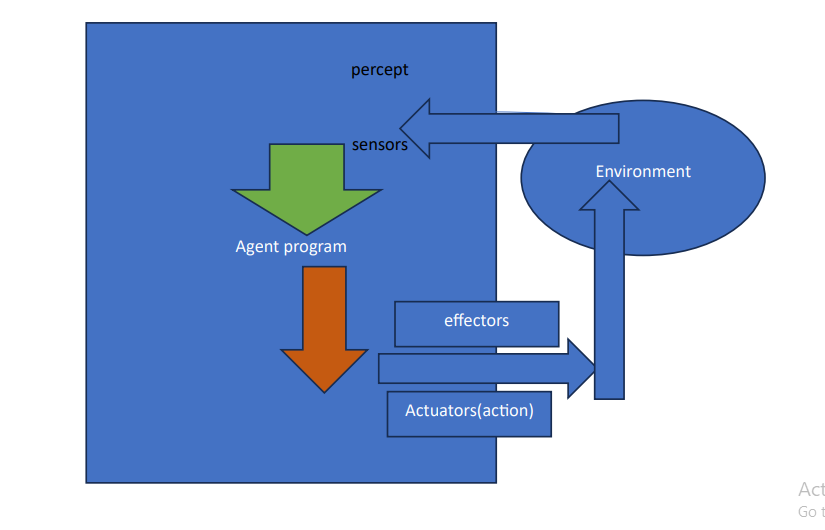Agents AI

what is an intelligent agent in ai
It can perceive some information from environment or Can perform some actions.
AI is defined as study of rational agents.
Rational agents = Agents they can take decisions
Person/firm/ Machine/system/software, etc.
what is an intelligent agent in ai by system
AI System is composed of
“Agents”
+
“Environment”

what is an intelligent agent in ai
Perceiving from environment through sensors.
Acting upon that environment through actuators
what is an intelligent agent in ai by ENVTRONENT
Environment = it refers to what we are seeing or what question we are being asked. Here it gives whatever questions it will ask from here or by typing its question further to the sensor.
what is an intelligent agent in ai by PERCEPT AND SENSORS
Percept and sensors = reduce the sensor to sense the coming in the sensor using its sensor and experience or anticipate it and further pass it on to the agent.
Example = The type of sensor of a human being is the eye, nose, ear, whose job is to sense, in the same way that the work of the sensor in this machine is the same.
what is an intelligent agent in ai by AGENT PROGRAM
Agent program = The work of the agent program is like the work of a human brain, its work is to give work to the brain running in the machine at what time.
what is an intelligent agent in ai by action
Effectors and Actuators (actions) After the program is finished by the agent, he gives it an action by taking action then or above the environment i.e. the questioner responds to the questioner.
note =
the AI agent who gives you the results with their help.
That means you should know about AI Creative
Then you will know how to work after making
what is an intelligent agent in ai by what is
what is agent
We can say that just as a person hires an agent to buy less or any such property or to answer any question, thus the agent is used to program the machine or to ask questions, so that different agents do different programs, due to which all our questions are answered.
what is an intelligent agent in ai by troduction
Introduction to AI Agents
In the world of technology, the term “AI agent” is becoming increasingly prevalent. But what exactly does it refer to? This article aims to unravel the concept of AI agents, exploring their types, applications, challenges, and their presence in our daily lives. AI agents are a crucial component of artificial intelligence, and understanding them is essential in the modern tech landscape.
Understanding AI Agents
Before delving into the intricacies, it’s important to comprehend the core concept. AI agents are computer programs or systems that have the ability to perceive their environment, make decisions, and take actions. These agents are designed to mimic human-like behavior, often with a focus on problem-solving and decision-makin
AI Agents work type
Reactive AI Agents
Reactive AI agents are rule-based systems that make decisions based on pre-defined rules. They do not have the ability to learn from past experiences or adapt to new situations. These agents are highly specialized and are commonly used in games and specific tasks.
Limited Memory AI Agents
Limited memory AI agents, as the name suggests, have a limited ability to store and recall past information. This allows them to make decisions based on a certain degree of memory, making them more adaptable than reactive agents.
Theory of Mind AI Agents
Theory of mind AI agents are at the forefront of AI research. These agents possess the ability to understand and interpret human emotions, beliefs, and intentions, making them more capable of human-like interactions
what is an intelligent agent in ai by type
Types of intelligent progaming Agents
Types of AI Agents
-
Simple Reflex Agents
2 Model Based Reflex Agents
-
Goal Based Agents.
-
Utility Based Agents
-
Learning Agents
-
Simple Reflex Agents
Simple reflex agents are basic autonomous systems in artificial intelligence that make decisions based solely on the current percept, or sensory input, without considering past actions or future consequences. These agents follow “if-then” rules or condition-action pairs to react to their environment. They lack memory or the ability to plan, making them suitable for straightforward, deterministic tasks. For example, a thermostat is a simple reflex agent; it triggers the heating or cooling system when the temperature crosses a predefined threshold. While these agents are limited in their capabilities and may not handle complex scenarios, they serve as foundational building blocks for more advanced AI systems.
Model Based Reflex Agents
Model-based reflex agents, in the field of artificial intelligence, enhance upon simple reflex agents by incorporating an internal model of their environment. These agents not only react to their current sensory input but also maintain a representation of the world that allows them to anticipate and plan for future actions. By simulating possible outcomes and considering different sequences of actions, they make decisions that extend beyond immediate reactions. This model-based approach increases their adaptability and problem-solving abilities, making them more suitable for complex tasks where understanding and predicting the consequences of actions are essential.
-
Goal Based Agents.
Goal-based agents are a class of intelligent systems that focus on achieving specific objectives within their environment. These agents have an understanding of their goals or desired outcomes, and they use this knowledge to make decisions. Unlike simple reflex agents that react to immediate sensory input or model-based agents that plan for future actions, goal-based agents work to fulfill their predefined goals by considering a broader context. They often employ reasoning, learning, and decision-making algorithms to determine the best course of action that leads them closer to their objectives. This goal-oriented approach allows them to handle more complex and dynamic tasks effectively.
-
Utility Based Agents
Utility-based agents are a sophisticated class of artificial intelligence systems designed to make decisions by assessing the utility or desirability of various outcomes. These agents consider not only their goals but also the associated costs, risks, and benefits of different choices. They assign numerical values, or utilities, to potential actions and use this information to select the most favorable course of action. Utility-based agents are especially useful in situations where there’s uncertainty and trade-offs among multiple objectives. They exhibit a rational decision-making approach, optimizing choices based on a utility function, allowing them to make decisions that balance competing factors and lead to optimal outcomes.
-
Learning Agents
Learning agents are a pivotal category of artificial intelligence systems that possess the ability to acquire knowledge and adapt to their environments through experience. These agents can improve their performance over time by learning from data, feedback, or interactions with their surroundings. They employ various learning methods, including supervised, unsupervised, and reinforcement learning, to make informed decisions, recognize patterns, and refine their behaviors. Learning agents are vital in a wide range of applications, from self-driving cars to recommendation systems and natural language processing, where the ability to continuously gather and apply new information allows them to become more capable and effective in their tasks.
what is an intelligent agent in ai by life
AI Agents in Everyday Life
AI agents are not just a part of the future; they are already integrated into our daily lives. From voice-activated smart speakers to recommendation algorithms on streaming platforms, AI agents have become a ubiquitous presence.
The Future of AI Agents
The future of AI agents holds promises and possibilities. With ongoing advancements in AI, we can expect more intelligent and capable AI agents. These agents could revolutionize fields such as healthcare, education, and entertainment.
Conclusion
In conclusion, AI agents represent a significant aspect of artificial intelligence. They come in various types, each with its own unique capabilities. The applications of AI agents are diverse, and their integration into everyday life continues to grow. However, it is essential to address the challenges and concerns associated with their use. The future of AI agents looks promising, and as technology evolves, we can anticipate more sophisticated and versatile AI agents.
what is an intelligent agent in ai by FAQ
Frequently Asked Questions (FAQs)
-
What is the primary function of AI agents? AI agents are primarily designed to perceive their environment, make decisions, and take actions. They mimic human-like behavior in various applications.
-
What are the different types of AI agents? There are three main types of AI agents: Reactive AI Agents, Simple Reflex Agents ,Model Based Reflex Agents , Goal Based Agents , Utility Based Agents ,Learning Agents
-
Where are AI agents commonly used in our daily lives? AI agents are integrated into devices and platforms such as virtual assistants, smart home systems, and recommendation algorithms on streaming services.
-
What are the ethical concerns associated with AI agents? Ethical concerns include issues related to privacy, bias in decision-making, and the potential loss of jobs due to automation.
-
How can AI agents shape the future of technology? AI agents have the potential to revolutionize fields like healthcare, education, and entertainment, making them more intelligent and capable.
what is an intelligent agent in ai
Smart speaker with Alexa (Blue) buy now Virtual assistants: smart ai
what is an intelligent agent in ai
36 ai features – what is artificial intelligence features
Ai history in legal advice -ai history filter -Foundational Concepts of AI
what is an intelligent agent in ai by troduction
what is AI // क्या है ai //type of ai
Reinforcement learning- (RL)-What is RL in reinforcement?-introduction
first Python programming-introduction Python programming